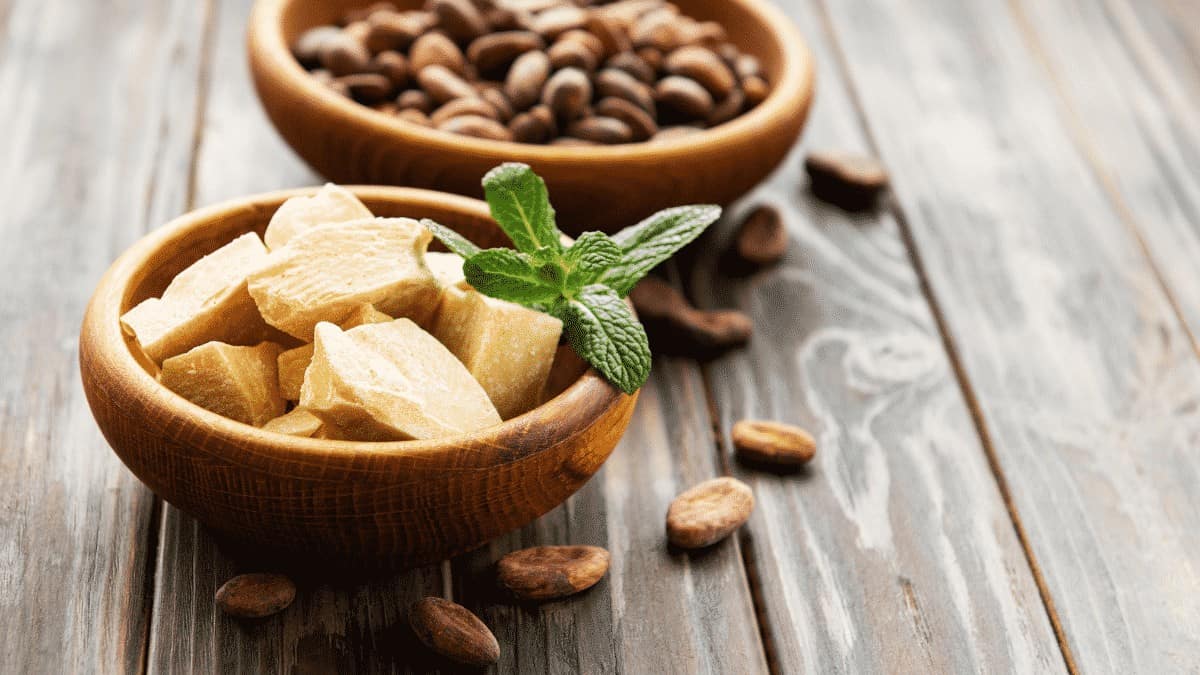Answer: Yes, vegans can eat cocoa butter.

What Is Cocoa Butter, Anyway?
Cocoa butter is a natural, edible fat extract that comes from cocoa beans. It has a pale yellow color, and it’s entirely free of milk, butter, or any other dairy products. So, it’s an entirely vegan food that not only tastes great but has a bunch of health benefits too. It also has benefits for skincare. That explains why you see it as an ingredient in so many skin products and ointments. More importantly, it’s also the primary ingredient of most of your favorite chocolates.
To extract it, the harvested cocoa beans get fermented. Then, after they dry, people roast the beans. The oil for the butter then gets extracted. The residue also has a lot of use in the form of cocoa powder.
Are All Cocoa Butter Products Vegan?
Well, no. Cocoa butter comes with multiple cosmetic and culinary uses. This means it’s very often a part of food items that have other dairy or animal products. In these cases, it’s important to know whether the food you’re eating is vegan, even though it may contain cocoa butter.
Which Cocoa Butter Foods to Avoid?
The cocoa butter, on its own, doesn’t have any animal or dairy ingredients. So, that’s nothing to worry about there. For example, dark chocolates usually come with cocoa butter as the main ingredient. They may have sugars and cocoa liquor too. But these are all relatively safe to consume for vegans.
But you should choose carefully when it comes to white chocolates or milk bars. These products usually have powdered or condensed milk in them. So, even if they have cocoa butter, these other dairy ingredients make them unfit for vegan consumption. Also, there are many cocoa butter foods that use ingredients like eggs, gelatin, honey, etc. You’ll usually find this combination of ingredients in chocolate cakes and some baked items.
To make sure that your cocoa butter product is vegan and healthy, you should regularly check out the other ingredients. Some examples of stuff to avoid are lactose, gelatin, dairy, eggs, honey, whey, carmine, cochineal, or Omega 3 fatty acids. The safest bet is to go for another product that you’re sure is vegan, if you aren’t sure about it.
Is Cocoa Butter Gluten-Free?
Yes. Cocoa butter is naturally and entirely gluten-free. Also, vegans can eat gluten too. The problem with gluten is not directly related to the vegan lifestyle. It’s only dangerous if you have health complications related to gluten.
Glutens are, essentially, a type of protein that you’ll find in some cereals and grains. Barley, rye, and wheat are some common examples of gluten foods. People sometimes know them as Prolamins too. And glutens can come in a variety of types too, depending on the source of food. For example, glutenins usually come from wheat, and Hordelins come from barley. You’ll find Secalins mostly in rye. But the point is that they’re each a type of gluten. But they’re all natural and vegan as far as consumption goes.
The only problem with gluten consumption is if you have allergies or reactions to them. For instance, if you have Celiac disease, gluten can be lethal to your health. In this case, it’s best to refrain from taking them. Several foods have both cocoa butter and gluten as ingredients. So, if you’re a vegan with gluten allergies, you’ll want to steer clear of foods that have gluten in them.
Health benefits of Cocoa Butter
Beyond being gluten- and dairy-free, cocoa butter is a fantastic addition to any vegan meal plan in 2025. Its appeal goes far beyond the rich, indulgent flavor reminiscent of dark chocolate. When consumed, cocoa butter offers antioxidants and boasts anti-inflammatory properties that can support overall wellness. It’s also known for its soothing and restorative effects on the skin, helping to fade stretch marks and blemishes naturally. Since cocoa butter is a pure, natural oil, it avoids the harsh side effects often associated with synthetic chemicals and ointments. Just be sure to check the ingredient list on any cocoa butter skincare products to ensure they don’t contain additives that might irritate your skin.
In its natural form, cocoa butter is completely safe for vegans and an incredibly useful ingredient in both diets and ointments.




